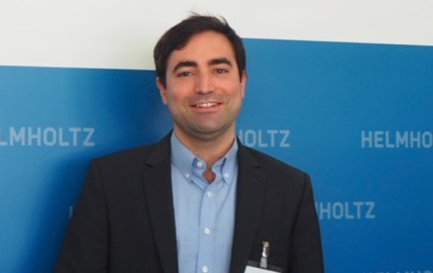Antoine Jacquey from GFZ section Basin Modelling received the Helmholtz Doctoral Award 2018 in the Research Field Energy on 6 November in Berlin. With his doctoral thesis, he made a major contribution to numerically describing the physical conditions in deep geothermal reservoirs. To this end, he has developed novel tools that take into account both the geological heterogeneities in the subsurface and the physical processes taking place there in three dimensions. Jacquey: "I feel very honored that the work I did during my doctorate has had such a positive effect and found recognition in the Helmholtz Association. I am very proud to be one of the six award winners and would like to thank my colleagues with whom I worked during my doctoral thesis.”
The Helmholtz Doctoral Prize has been awarded annually since 2013 in the six research areas Energy, Earth & Environment, Health, Aeronautics, Space and Transport, Matter, and Key Technologies. Jacquey is the first GFZ researcher to receive it. Born in Castres (France), he studied physics, chemistry and mathematics in Montpellier before obtaining his Master of Science degree in energy and process engineering from the École des Mines de Saint-Étienne. As part of his studies, he completed an internship at the Royal Institute of Technology (KTH) in Stockholm, spent a year as an Erasmus exchange student at the Technical University of Berlin and wrote his master's thesis at the Institute of Energy Technology in Kjeller (Norway). In 2014 he began his doctoral studies at the GFZ Potsdam in cooperation with the RWTH Aachen and graduated with distinction in 2017.
Jacquey is currently working as a postdoctoral fellow at the GFZ and is part of the Helmholtz Initiative ESM (Advanced Earth System Modeling Capacity): “I am working on the description and modelling of deformation mechanisms around the brittle-ductile transition at different scales. This topic is really interesting and could be useful for several applications such as extracting heat from supercritical geothermal reservoirs or understanding the physics controlling earthquakes rupture and identifying potential precursors.”
The winners will receive a one-off prize of 5,000 euros and a further 2,000 euros per month over a period of six months for a research stay abroad. Jacquey would like to use the money to establish new cooperations or strengthen existing ones with international partners: "The travel prize money is a great asset to do so, and I hope it will help to increase my research experience abroad. I already have some ideas of groups to visit in Europe and in the US and will start planning the details early next year.”








![[Translate to English:] Torsten Sachs in front of a climate station on a field](/fileadmin/_processed_/3/9/csm__TorstenSachs_bearbeitet_GS_4a1365ef84.jpeg)

![[Translate to English:] left image flood at the Ahrtal: image from above, several houses are flooded; left image:: Heidi Kreibich;](/fileadmin/_processed_/4/4/csm_Bild2_9af0130e9f.png)



![[Translate to English:] Start der Vega Rakete](/fileadmin/_processed_/6/4/csm_20231201-kachel_Vega-VV23-launch_ESA-CNES-Arianespace_706716b68c.jpeg)









![[Translate to English:] Poster exhibition at the Brandenburg Hydrogen Day at the GFZ, some participants in the foreground](/fileadmin/_processed_/6/5/csm_Erster_Brandenburgischer_Wasserstofftag_GFZ_402fcec95e.jpeg)
![[Translate to English:] Group picture of the participants](/fileadmin/_processed_/9/4/csm_20231108_CAWa-Workshop-Tashkent_Gruppenbild_99ea779d8a.jpeg)

![[Translate to English:] [Translate to English:] Hörsaal](/fileadmin/_processed_/e/6/csm_H%C3%B6rsal_e21ac645fb.jpeg)


![[Translate to English:] The Delegations in the Historic Library on the Telegrafenberg. In the back there are from left to right, the Dutch Ambassador for Germany, Ronald van Roeden, the Dutch Minister for Education, Culture and Science, Robbert Dijkgraaf and the scientific director of the GFZ, Susanne Buiter.](/fileadmin/_processed_/d/b/csm_Kachel-2_9eba4b4212.jpeg)

